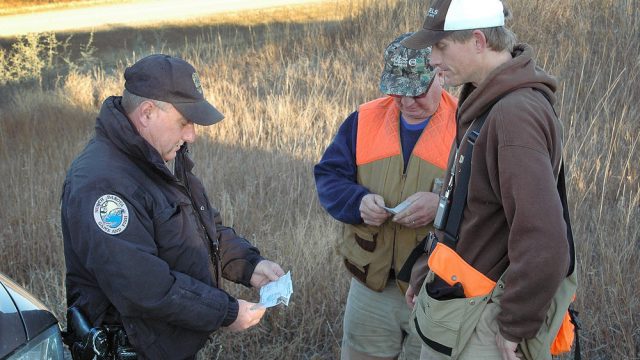Are North Dakota Game & Fish Roadblocks Legal?

Game wardens in North Dakota are licensed peace officers so anyone who does not already have that license will go through the law enforcement training academy upon hiring. Candidates also need a valid driver’s license, must have excellent interpersonal skills in communications and writing, and must not have a record of any felony convictions. N.D. Game and Fish Department photo
With hunting season upon us one thing you might see while driving North Dakota roads is a Game & Fish roadblock where game wardens are looking to search your vehicle to detect infractions.
According to Robert Timian, the head game warden for the Game & Fish Department, they’ve held 11 roadblocks already this year with more coming this fall. But are they legal?
The North Dakota Supreme Court has ruled on the issue in 1997 and upheld the legality of the roadblocks, but a Fargo attorney tells me that given court rulings since the matter was reviewed may put them outside of legal bounds.
I wrote about it at Watchdog today:
Timian says the check stations “have been reviewed by the North Dakota Supreme Court,” which “has said that if conducted in the proper manner they are legal and do serve the public interest.”
But Mark Friese, a former police officer who is now an attorney for the Vogel Law Firm, says shifting court precedent may push Game and Fish checkpoints outside legal bounds. While DUI checkpoints are justified by a public interest in road safety, Friese says, hunting and fishing checkpoints fail that test.
“In 1997, in State v. Albaugh, the North Dakota Supreme Court held the use of game-and-fish roadblocks was constitutional,” Friese told Watchdog. “At the time Albaugh was decided, the United States Supreme Court had addressed only the lawfulness of roadblocks to verify drivers were licensed, drunk driving roadblocks and roving border-enforcement roadblocks, finding all of these categories constitutionally permissible.”
Since then, Friese says, the courts have looked askance at other sorts of roadblocks.
“Subsequently, in 2000, in City of Indianapolis v. Edmond, the United States Supreme Court held that roadblocks designed to detect ‘ordinary criminal wrongdoing’ were unconstitutional,” Friese said.
At issue in the Edmond case were roadblocks aimed at detecting drug possession and trafficking. “Finding drug-detection roadblocks amounted to general crime control rather than ensuring roadway safety, the Court held the Edmond roadblock unconstitutional,” Friese said.
Cutting through some of the legalese, what Friese is saying is that DUI checkpoints have been upheld because the public’s interest in safety – specifically, safe roads – is more important than the privacy considerations of motorists. But remove the public safety aspect from it – poachers are not the same thing as drunk drivers – and the courts haven’t been so willing to uphold the roadblocks.
Basically, law enforcement – up to and including game wardens – can’t just stop every car on the road for routine enforcement of the criminal code. At least, that’s what courts in other parts of the country have found.
Should North Dakota’s Game & Fish checkpoints get a new legal challenge, it may well be that they’d be ruled illegal.




